Postpartum care is a critical but often overlooked aspect of maternal health. After childbirth, a woman’s body undergoes significant changes as it recovers from the physical and emotional demands of pregnancy and delivery. The postpartum period, often referred to as the “fourth trimester,” typically lasts six weeks, but recovery can take longer depending on the individual and type of delivery.
Physically, the body is healing from labor and delivery, whether it was vaginal or through a cesarean section. Women may experience postpartum bleeding, soreness, and fatigue during the first few weeks. Rest is crucial, but with the demands of caring for a newborn, it can be challenging. Prioritizing sleep when the baby sleeps, asking for help, and taking things slowly can aid in recovery.
Breastfeeding introduces additional challenges. For some women, breastfeeding can come naturally, while for others, it may be difficult. Sore nipples, engorgement, or concerns about milk supply can cause frustration. Lactation consultants or support groups can provide invaluable guidance during this time. Additionally, staying hydrated and consuming nutrient-rich foods can support milk production and overall health.
Hormonal changes play a significant role in the postpartum period. Many women experience “baby blues” due to fluctuations in hormones, leading to mood swings, irritability, or sadness. However, if these feelings persist or worsen, they may signal postpartum depression, which affects about one in seven women. Recognizing the signs and seeking professional help is crucial for the mother’s mental health and her ability to care for her baby.
Postpartum physical recovery also involves regaining strength and fitness. Gentle exercises, such as pelvic floor exercises or walking, can help restore muscle tone and improve circulation. However, it’s essential to listen to the body and avoid pushing too hard, especially in the early weeks. Postpartum care should include checkups with healthcare providers to monitor recovery and address any complications.
In many cultures, postpartum care includes traditional practices that focus on rest, proper nutrition, and emotional support from family members. While these customs vary globally, they share the common goal of allowing the mother time to heal and bond with her baby. Whether through modern medical care or traditional methods, postpartum support is crucial in helping women recover and adjust to motherhood.
In conclusion, postpartum care is a vital component of maternal health that deserves more attention. Proper rest, support, nutrition, and mental health care can significantly improve recovery outcomes for new mothers. Understanding the challenges and seeking help when needed can make the postpartum period a smoother transition for both mother and baby.



